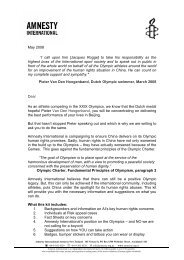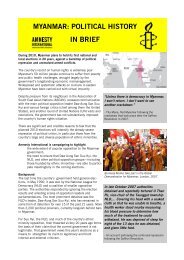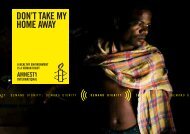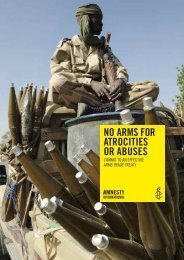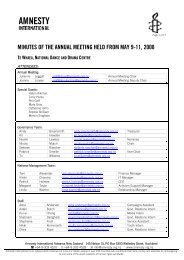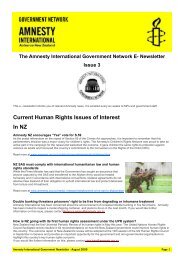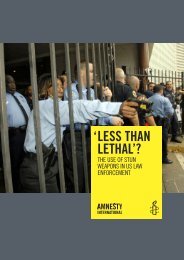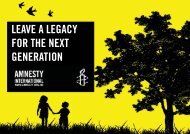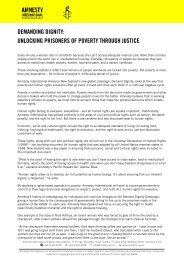Six-Point Checklist on Justice for Violence Against Women
Six-Point Checklist on Justice for Violence Against Women
Six-Point Checklist on Justice for Violence Against Women
You also want an ePaper? Increase the reach of your titles
YUMPU automatically turns print PDFs into web optimized ePapers that Google loves.
SIX-POINT CHECKLISTON JUSTICE FORVIOLENCE AGAINST WOMENSTOP VIOLENCEAGAINST WOMEN
QUICK REFERENCE GUIDE1/ARE THE EXISTING LAWS ADEQUATE? 32/IS IT SAFE FOR A VICTIM TO REPORT A CRIME OF SEXUALOR GENDER-BASED VIOLENCE? 53/ARE COLLECTION OF FORENSIC EVIDENCE AND PROVISION OFMEDICAL CARE APPROPRIATE AND ADEQUATE? 74/ARE THERE SPECIFIC OBSTACLES WHICH PREVENT A VICTIM FROMACCESSING APPROPRIATE SERVICES IN A TIMELY WAY? 95/IS INVESTIGATION OF CRIMES EFFICIENT AND THOROUGH? 106/ARE TRIALS FAIR, COMPETENT AND EFFICIENT? 12
SIX-POINT CHECKLISTON JUSTICE FOR VIOLENCE AGAINST WOMENAmnesty Internati<strong>on</strong>al’s checklist <strong>for</strong> identifying obstacles to justice <strong>for</strong> women or girls whoare victims and survivors of sexual and other <strong>for</strong>ms of gender-based violence.Sexual and gender-based acts of violence are alwaysa crime and a fundamental violati<strong>on</strong> of humanrights. Sadly, violence is a daily reality <strong>for</strong> manywomen in every country in the world. Internati<strong>on</strong>alhuman rights standards oblige states to criminalizerape and other <strong>for</strong>ms of sexual and gender-basedviolence and to address those crimes. States cannotuse the excuse of domestic laws which fail to reflectthe reality of sexual violence and women’s right toreparati<strong>on</strong>, as a reas<strong>on</strong> <strong>for</strong> failing to take measuresto prevent violence, to investigate cases andprosecute alleged perpetrators, and to providereparati<strong>on</strong>s to women.In the case of violence committed by state actors,such as the police, armed <strong>for</strong>ces, or in custodialsettings, rape and other sexual violence c<strong>on</strong>stitutetorture. In the case of other perpetrators who holda positi<strong>on</strong> of trust, such as teachers, religiousleaders or doctors, sexual violence is a crime andalso a breach of a duty of care.Amnesty Internati<strong>on</strong>al’s Stop <strong>Violence</strong> against<strong>Women</strong> campaign aims to build <strong>on</strong> its earliersuccesses which have c<strong>on</strong>tributed to positivechanges in laws, policies and practices that addresssexual and gender-based violence at the regi<strong>on</strong>al,nati<strong>on</strong>al and internati<strong>on</strong>al levels. This includeslaws that criminalize sexual violence, including inarmed c<strong>on</strong>flict, laws which address rape andother <strong>for</strong>ms of violence within marriage, and lawsof evidence and rules of procedure that eliminateprevious discriminatory practices which madewomen unequal be<strong>for</strong>e the law.However, despite these successes, AmnestyInternati<strong>on</strong>al is acutely aware of how little differencethey have made to the lives of women and girlswho are victims and survivors of sexual andgender-based violence. (Amnesty Internati<strong>on</strong>alrecognizes that men and boys also face sexualand gender-based violence and may face thesame or similar obstacles when seeking justice.)AMNESTY INTERNATIONAL – SIX-POINT CHECKLIST ON JUSTICE FOR VIOLENCE AGAINST WOMEN1
This checklist is intended to help activists andadvocates to identify: laws, policies and practices which still need tobe re<strong>for</strong>med and obstacles to the successful implementati<strong>on</strong>of laws and policies.The checklist is based <strong>on</strong> internati<strong>on</strong>al humanrights law and standards. It is organized accordingto the steps that victims would need to take inorder to report a crime and seek redress <strong>for</strong>sexual and gender-based violence through thecriminal justice system.In each nati<strong>on</strong>al c<strong>on</strong>text, it is important to ask sixmain questi<strong>on</strong>s:1) Are the existing laws adequate?2) Is it safe <strong>for</strong> a victim to report a crime of sexualor gender-based violence?3) Are collecti<strong>on</strong> of <strong>for</strong>ensic evidence and provisi<strong>on</strong>of medical care appropriate and adequate?4) Are there specific obstacles which prevent avictim from accessing appropriate services ina timely way?5) Is investigati<strong>on</strong> of crimes efficient and thorough?6) Are trials fair, competent and efficient?The six key questi<strong>on</strong>s that <strong>for</strong>m the basis of thischecklist are interrelated. Using this checklist shouldallow activists to identify what changes are needed,in law or in practice, to ensure that victims andsurvivors of sexual or gender-based violence havemeaningful access to services and justice. However,depending <strong>on</strong> the jurisdicti<strong>on</strong>, activists are likely toidentify different obstacles under different elementsof the checklist.2AMNESTY INTERNATIONAL – SIX-POINT CHECKLIST ON JUSTICE FOR VIOLENCE AGAINST WOMEN
1/ARE THE EXISTING LAWS ADEQUATE?Sexual and gender-based violence mustbe criminalized. Rape and other <strong>for</strong>ms of sexual violenceshould be defined as sexual c<strong>on</strong>duct in whichthe victim involved was coerced, by violent orn<strong>on</strong>-violent means, and there<strong>for</strong>e her agreementto engage in sexual acts was not truly and freelygiven. There should be no assumpti<strong>on</strong> in law orin practice that a victim gives her c<strong>on</strong>sentbecause she has not physically resisted theunwanted sexual c<strong>on</strong>duct regardless of whetheror not the perpetrator threatened to use or usedphysical violence. Criminal law should identify rape and othersexual violence as crimes against the physical andmental integrity of the victim, rather than as a crimeagainst morality or h<strong>on</strong>our. The law criminalizing thec<strong>on</strong>duct should be gender-neutral. Criminal law should enable the effectiveprosecuti<strong>on</strong> of any perpetrator <strong>for</strong> acts of sexualviolence, and there should be no exempti<strong>on</strong>s<strong>for</strong> certain perpetrators (such as a marital rapeexempti<strong>on</strong> which assumes that married womenautomatically c<strong>on</strong>sent to sexual c<strong>on</strong>tact withtheir husbands). Crimes of sexual and gender-based violence insituati<strong>on</strong>s of armed c<strong>on</strong>flict should be investigatedand prosecuted based <strong>on</strong> the understandingthat acts of sexual and gender-based violencein c<strong>on</strong>flict are war crimes. Furthermore, superiororders are not a defence and the issue ofcommand resp<strong>on</strong>sibility should be investigated.Where the violence is widespread or systematic,it should be investigated as a possible crimeagainst humanity. There should be no discriminatory defences <strong>for</strong>perpetrators available <strong>on</strong> the grounds of “h<strong>on</strong>our”,“passi<strong>on</strong>” or “provocati<strong>on</strong>” that can be used to limitcriminal liability <strong>for</strong> sexual violence. Gender-based violence, <strong>for</strong> example violencein an intimate partner relati<strong>on</strong>ship, should beAMNESTY INTERNATIONAL – SIX-POINT CHECKLIST ON JUSTICE FOR VIOLENCE AGAINST WOMEN3
criminalized and treated within the criminal justicesystem with the seriousness af<strong>for</strong>ded comparableacts of violence between n<strong>on</strong>-family members.There should be no assumpti<strong>on</strong> that a partner,parent, spouse, sibling or child has the right to“discipline” a woman or girl through the threatof or use of physical violence.The legal framework must not discriminate againstwomen or girls seeking justice and must not leadto further violati<strong>on</strong>s of their rights. All victims should be equally protected inthe law from violence with no discriminati<strong>on</strong> <strong>on</strong> thebasis of age, race, ethnicity, religi<strong>on</strong>, marital status,social status, caste or descent, migrati<strong>on</strong>status, employment (including sex work), sexualpractice or sexual orientati<strong>on</strong> (<strong>for</strong> example,lesbians), gender identity (<strong>for</strong> example, transgenderwomen) or appearance (<strong>for</strong> example, the way awoman is dressed). A victim who reports sexual or gender-basedviolence must not run the risk of being charged witha crime such as adultery, prostituti<strong>on</strong>, <strong>for</strong>nicati<strong>on</strong>,homosexuality, being in a country irregularly and so<strong>on</strong>. She must also not run the risk of losing custodyof her children (<strong>for</strong> example, in cases of marital rape). There must be no legal provisi<strong>on</strong>s thatundermine or devalue the testim<strong>on</strong>y of women orgirls so l<strong>on</strong>g as it is clear that they are competentto testify. In particular, there must be no requirementthat the victim’s evidence must be corroboratedby other evidence; no use of the “cauti<strong>on</strong>ary rule”(which requires judges to warn juries thatcomplainants may be motivated to lie about thecase, are pr<strong>on</strong>e to exaggerati<strong>on</strong> or fantasy, orthat their evidence may there<strong>for</strong>e be unreliable);no inference that a woman or girl who was underthe influence of alcohol or drugs (even minimally)at the time of the offence against her is resp<strong>on</strong>sible<strong>for</strong> the violence; no inference that a woman or girlis to blame because of how she was dressed, noinference that a woman or girl is to blame becauseof where she was. Sex workers or women in theentertainment business should not be subjectedto disparate treatment because of their employment.Furthermore, there should be a str<strong>on</strong>g presumpti<strong>on</strong>that evidence of sexual history should not beintroduced into the trial, in order to avoiddiscriminatory inferences being made about acomplainant’s credibility, character or predispositi<strong>on</strong>to sexual availability.4AMNESTY INTERNATIONAL – SIX-POINT CHECKLIST ON JUSTICE FOR VIOLENCE AGAINST WOMEN
2/IS IT SAFE FOR A VICTIM TO REPORTA CRIME OF SEXUAL OR GENDER-BASEDVIOLENCE?The state must ensure that victims and survivorsof sexual or other <strong>for</strong>ms of gender-based violencehave access to safe and timely avenues to reportthe crime. States must ensure that the police and other lawen<strong>for</strong>cement officers in no way intimidate, threatenor humiliate victims of sexual or gender-basedviolence, either when they file their complaint orduring the subsequent investigati<strong>on</strong>. The policeshould immediately ascertain if the complainant isat risk of further violence and if so, ensure that thevictim receives appropriate protecti<strong>on</strong>. There should be en<strong>for</strong>ceable codes of c<strong>on</strong>ductguaranteeing that police officers work professi<strong>on</strong>allywith victims of sexual or gender-based violence.This should include a prohibiti<strong>on</strong> against dismissive,discriminatory, aggressive, unduly sceptical orunprofessi<strong>on</strong>al attitudes. Codes of c<strong>on</strong>ductshould include provisi<strong>on</strong>s <strong>for</strong> holding officersaccountable in cases where survivors have notbeen treated appropriately. Victims should be allowed to bring anadvocate into any meetings with the police orother investigators. Police officers should be trained (as part of theirbasic training and as <strong>on</strong>going professi<strong>on</strong>al training)in best practice methods of interviewing andsupporting victims who have been subjected tosexual violence. Victims should be interviewed in a secureand private envir<strong>on</strong>ment. Police officers should,as routine practice, assess the safety of thecomplainant and implement measures to ensurethe victim’s safety during the <strong>on</strong>going investigati<strong>on</strong>(<strong>for</strong> example by en<strong>for</strong>cing a civil injuncti<strong>on</strong> ifavailable to <strong>for</strong>bid a perpetrator from approachingthe complainant). In no case should a complainantbe put in “protective custody”.AMNESTY INTERNATIONAL – SIX-POINT CHECKLIST ON JUSTICE FOR VIOLENCE AGAINST WOMEN5
All cases must be registered immediately andfull in<strong>for</strong>mati<strong>on</strong> about the progress and regularupdates provided to the complainant and thevictim’s advocate. The police should issue a uniquecase number which facilitates tracking. Victims who are in any <strong>for</strong>m of state custody orother instituti<strong>on</strong>al settings must have a securemeans of making a complaint to an appropriateentity outside the instituti<strong>on</strong>. In no case should theinvestigati<strong>on</strong> be handled internally. For example,pris<strong>on</strong> officials should not investigate allegati<strong>on</strong>s ofabuse by pris<strong>on</strong> staff but should refer such cases topolice who specialize in investigating sexual andgender-based violence.6AMNESTY INTERNATIONAL – SIX-POINT CHECKLIST ON JUSTICE FOR VIOLENCE AGAINST WOMEN
3/ARE COLLECTION OF FORENSIC EVIDENCEAND PROVISION OF MEDICAL CAREAPPROPRIATE AND ADEQUATE?Collecti<strong>on</strong> and processing of <strong>for</strong>ensic evidencemust be effective, must not exclude victims <strong>on</strong>grounds of cost or locati<strong>on</strong> and must not furthertraumatize the victim. Medical professi<strong>on</strong>als should be trained in theWorld Health Organizati<strong>on</strong> (WHO) protocol <strong>on</strong> thecollecti<strong>on</strong> of <strong>for</strong>ensic evidence in cases of sexualand gender-based violence. They should take notesand collect samples in a way that ensures that theevidence can be used in criminal trials, <strong>for</strong> example,protecting the chain of custody of evidence. Medical professi<strong>on</strong>als should be trained in citingappropriate facts in the <strong>for</strong>ensic medical report ina <strong>for</strong>mat that could be used by police andprosecuting authorities in taking acti<strong>on</strong>s againstperpetrators. Forensic medical experts should neverdraw c<strong>on</strong>clusi<strong>on</strong>s of law. Medical professi<strong>on</strong>als should refer survivors toappropriate support services. The criminal justice system should not requirethat victims reporting rape or sexual violencereceive a separate <strong>for</strong>ensic medical examinati<strong>on</strong>.The separati<strong>on</strong> of treatment from evidencecollecti<strong>on</strong> violates the right to health and raisesserious ethical issues. The initial examinati<strong>on</strong> at anyhealth services should be d<strong>on</strong>e in such a way as toensure that <strong>for</strong>ensic evidence which could be used<strong>for</strong> the investigati<strong>on</strong> and trial is collected at that time. If a separate <strong>for</strong>ensic medical examinati<strong>on</strong> isrequired, the medico-legal examiners should betrained in the WHO protocol <strong>on</strong> the collecti<strong>on</strong> of<strong>for</strong>ensic evidence in cases of sexual and genderbasedviolence. The <strong>for</strong>ensic medical examinati<strong>on</strong> should beaccessible to the survivors, both physically andgeographically. Financial assistance <strong>for</strong> travel costsshould be available and examinati<strong>on</strong>s should befree of charge. In no case should a victim’s inabilityto pay preclude the victim from getting theexaminati<strong>on</strong> and appropriate medical care.AMNESTY INTERNATIONAL – SIX-POINT CHECKLIST ON JUSTICE FOR VIOLENCE AGAINST WOMEN7
Examinati<strong>on</strong> should take place as so<strong>on</strong> aspossible as some types of evidence must becollected within hours. If a victim is unable toaccess a <strong>for</strong>ensic specialist in a timely manner,that fact should in no way be used to underminethe complaint. Survivors should not be charged <strong>for</strong> collecti<strong>on</strong>of samples (such as the cost of “rape kits”) or<strong>for</strong> documenting the results of the testing in amedical report.8AMNESTY INTERNATIONAL – SIX-POINT CHECKLIST ON JUSTICE FOR VIOLENCE AGAINST WOMEN
4/ARE THERE SPECIFIC OBSTACLES WHICHPREVENT A VICTIM FROM ACCESSINGAPPROPRIATE SERVICES IN A TIMELY WAY?Victims of sexual or other gender-based violencemust have immediate access to appropriatehealth services. Health services should be physically andgeographically available and accessible to all victimsof sexual or gender-based violence. The patientshould be reimbursed <strong>for</strong> travel costs if she cannotaf<strong>for</strong>d them. If the health facility charges user fees,the inability to pay the fee should not precludetreatment. Fees should be waived <strong>for</strong> any<strong>on</strong>e whootherwise would not be able to access the services. Victims seeking health services after an act ofsexual or gender-based violence should be able tosee a medical practiti<strong>on</strong>er of their choice (a womanor a man). Health services should provide a woman or girlwho has been raped with appropriate medicalcare, such as emergency c<strong>on</strong>tracepti<strong>on</strong>; HIV postexposureprophylaxis; gynaecological care <strong>for</strong>injuries sustained in the assault, as well as generalmedical care <strong>for</strong> other injuries; and initialpsychological support. Medical professi<strong>on</strong>als attending survivorsimmediately after an act of sexual or gender-basedviolence should be trained to deal with survivors’needs professi<strong>on</strong>ally and supportively, and treatthem c<strong>on</strong>fidentially and with no discriminati<strong>on</strong>.Health service providers should be able to referpatients to other appropriate services such aspsychological counselling and legal services. Accessible and appropriate services includingaborti<strong>on</strong> should be available to women andgirls who have become pregnant as a result ofrape or incest.AMNESTY INTERNATIONAL – SIX-POINT CHECKLIST ON JUSTICE FOR VIOLENCE AGAINST WOMEN9
5/IS INVESTIGATION OF CRIMES EFFICIENTAND THOROUGH?Investigati<strong>on</strong> must be c<strong>on</strong>ducted in a timelymanner and explore all relevant evidence tosupport appropriate prosecuti<strong>on</strong>. The investigating authorities should protectthe identity of the survivor if that is what thesurvivor wants. The police must not pre-judge the evidencebe<strong>for</strong>e the investigati<strong>on</strong> has even started (<strong>for</strong>example, by disbelieving the complainant’s versi<strong>on</strong>or by in<strong>for</strong>mally encouraging them to drop thecomplaint “<strong>for</strong> their own good”). There should be clear criteria defining when thepolice must refer a case to the prosecutor. Whenthey do not take further acti<strong>on</strong> <strong>on</strong> a case, they shouldbe required to record the reas<strong>on</strong>s and in<strong>for</strong>m thecomplainant. Their reas<strong>on</strong>s and decisi<strong>on</strong> should beavailable <strong>for</strong> appeal to the prosecuting authorities. The police should not mediate agreementsbetween perpetrators and victims, they should notfacilitate in<strong>for</strong>mal payment of compensati<strong>on</strong> andthey should not encourage resoluti<strong>on</strong> through aparallel legal system such as a tribal court. Statistics <strong>on</strong> the resoluti<strong>on</strong> of investigati<strong>on</strong>sshould be gathered and published. They shouldprovide in<strong>for</strong>mati<strong>on</strong> <strong>on</strong> cases disaggregated byfactors such as the sex, race and age of the victim.Prosecutors must initiate criminal proceedingsagainst suspects where probable cause exists. If prosecutors take the decisi<strong>on</strong> to disc<strong>on</strong>tinuea case, they should record the reas<strong>on</strong>s <strong>for</strong> this andpromptly in<strong>for</strong>m the complainant. Prosecutorialdiscreti<strong>on</strong> should not be used to dismiss cases inwhich there is sufficient evidence to proceed andif the complainant wishes to go <strong>for</strong>ward. The investigati<strong>on</strong> and prosecuti<strong>on</strong> must becarried out in compliance with the principles ofdue diligence.10AMNESTY INTERNATIONAL – SIX-POINT CHECKLIST ON JUSTICE FOR VIOLENCE AGAINST WOMEN
The office of the prosecutor should routinelypublish statistics <strong>on</strong> the resoluti<strong>on</strong> of cases referredto its office. It should provide in<strong>for</strong>mati<strong>on</strong> <strong>on</strong>cases disaggregated by factors such as the sex,race and age of the victim, and <strong>on</strong> cases that havenot been pursued. The lawyers and investigators within the officeof the prosecutor should be trained in dealingwith victims of sexual or gender-based violence,especially in the appropriate use of medicalevidence, and use of expert evidence, such aspsychological or psychiatric reports. Prosecutors should ensure that witnesses areproperly protected from further violence throughwitness protecti<strong>on</strong> measures, irrespective of whetherthe threat comes from the alleged perpetrator, orothers, including relatives of the complainant whomay be acting in the name of family “h<strong>on</strong>our”.Under no circumstances should protecti<strong>on</strong> takethe <strong>for</strong>m of “protective” custody in a jail or pris<strong>on</strong>. Prosecutors should preserve the dignity ofvictims and witnesses in the courtroom by ensuringthat defence lawyers cross-examine witnessesprofessi<strong>on</strong>ally, without using bullying tactics toundermine the credibility of witnesses; and byensuring that witnesses and victims can useequipment such as closed-circuit cameras togive their evidence, or can give their testim<strong>on</strong>yin camera (in a closed courtroom). There should be independent oversight of theprosecutors’ work to assess how cases relating tosexual or gender-based violence are being managed.AMNESTY INTERNATIONAL – SIX-POINT CHECKLIST ON JUSTICE FOR VIOLENCE AGAINST WOMEN11
6/ARE TRIALS FAIR, COMPETENT ANDEFFICIENT?Trials must be fair, free of discriminati<strong>on</strong> andthe rights of the victim and defendant mustbe protected. Judges are resp<strong>on</strong>sible <strong>for</strong> maintaining theprivacy of the victim’s identity if the victim so chooses. Judges and lawyers should be trained inunderstanding crimes of sexual and genderbasedviolence. Judges should be trained to preside over cases ofsexual and gender-based violence. They should beheld resp<strong>on</strong>sible <strong>for</strong> maintaining a safe and respectfulenvir<strong>on</strong>ment within the courtroom, in particularensuring that witnesses are protected from abusive ordemeaning treatment by the defence. Judges mustgive clear directi<strong>on</strong>s <strong>on</strong> the law to jurors. Judges should not allow evidence about theprevious sexual history of a complainant to be raisedin court, apart from in very excepti<strong>on</strong>al cases wheresuch evidence is necessary to avoid a miscarriage ofjustice, <strong>for</strong> example, if a complainant says she hadnot met the accused be<strong>for</strong>e, when in fact they hadbeen living together. If jury trials are routinely used in cases of sexualviolence, jurors should be screened <strong>for</strong> any biasagainst women or victims of gender-based violence.They should be drawn from diverse backgrounds,sworn to keep the details of the case c<strong>on</strong>fidential andproperly guided <strong>on</strong> the law by the judge. Sentences imposed <strong>on</strong> perpetrators found guiltyof rape and sexual violence should be proporti<strong>on</strong>ateto the crime. In no case is impositi<strong>on</strong> of the deathpenalty appropriate or acceptable. Survivors should be in<strong>for</strong>med when theirattackers are to be released or paroled frompris<strong>on</strong>; and updated safety assessments shouldbe carried out. Perpetrators c<strong>on</strong>victed of crimes of sexual orgender-based violence should be given access toappropriate rehabilitati<strong>on</strong> programs; such programmesshould be carefully m<strong>on</strong>itored <strong>for</strong> effectiveness.12AMNESTY INTERNATIONAL – SIX-POINT CHECKLIST ON JUSTICE FOR VIOLENCE AGAINST WOMEN
Amnesty Internati<strong>on</strong>al is a global movement of 2.2 milli<strong>on</strong> people in more than150 countries and territories who campaign to end grave abuses of human rights.STOP VIOLENCEAGAINST WOMENOur visi<strong>on</strong> is <strong>for</strong> every pers<strong>on</strong> to enjoy all the rights enshrined in the UniversalDeclarati<strong>on</strong> of Human Rights and other internati<strong>on</strong>al human rights standards.We are independent of any government, political ideology, ec<strong>on</strong>omic interest orreligi<strong>on</strong> – funded mainly by our membership and public d<strong>on</strong>ati<strong>on</strong>s.Amnesty Internati<strong>on</strong>al Publicati<strong>on</strong>sFirst published in 2010 byAmnesty Internati<strong>on</strong>al Publicati<strong>on</strong>sInternati<strong>on</strong>al SecretariatPeter Benens<strong>on</strong> House1 East<strong>on</strong> StreetL<strong>on</strong>d<strong>on</strong> WC1X 0DWUnited Kingdomwww.amnesty.org© Amnesty Internati<strong>on</strong>al Publicati<strong>on</strong>s 2010Index: ACT 77/002/2010Original language: EnglishPrinted by Amnesty Internati<strong>on</strong>al,Internati<strong>on</strong>al Secretariat, United KingdomAll rights reserved. This publicati<strong>on</strong> iscopyright, but may be reproduced byany method without fee <strong>for</strong> advocacy,campaigning and teaching purposes,but not <strong>for</strong> resale. The copyright holdersrequest that all such use be registeredwith them <strong>for</strong> impact assessmentpurposes. For copying in any othercircumstances, or <strong>for</strong> re-use in otherpublicati<strong>on</strong>s, or <strong>for</strong> translati<strong>on</strong> oradaptati<strong>on</strong>, prior written permissi<strong>on</strong>must be obtained from the publishers,and a fee may be payable.
Amnesty Internati<strong>on</strong>alInternati<strong>on</strong>al SecretariatPeter Benens<strong>on</strong> House1 East<strong>on</strong> StreetL<strong>on</strong>d<strong>on</strong> WC1X 0DWUnited Kingdomwww.amnesty.orgIndex: ACT 77/002/2010March 2010STOP VIOLENCEAGAINST WOMEN



